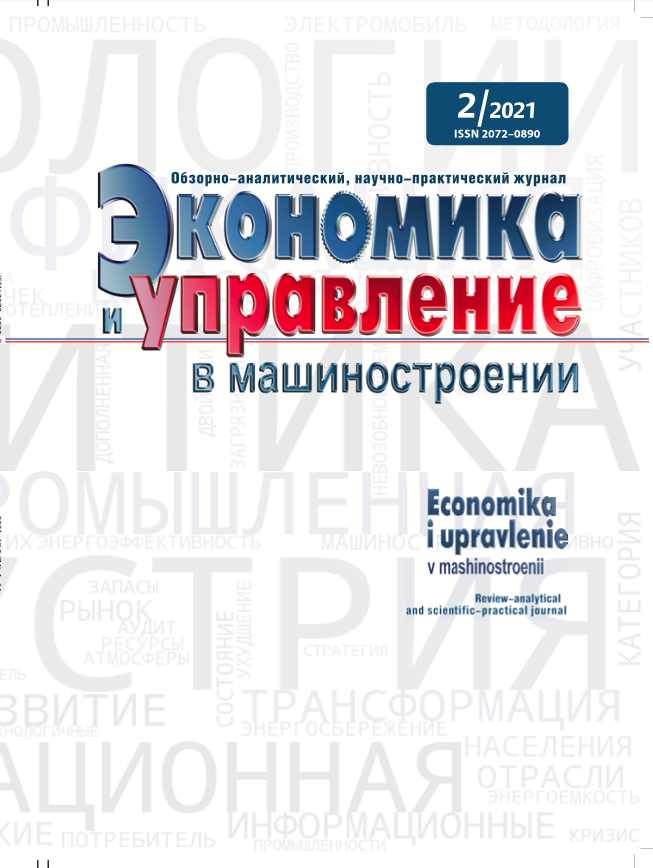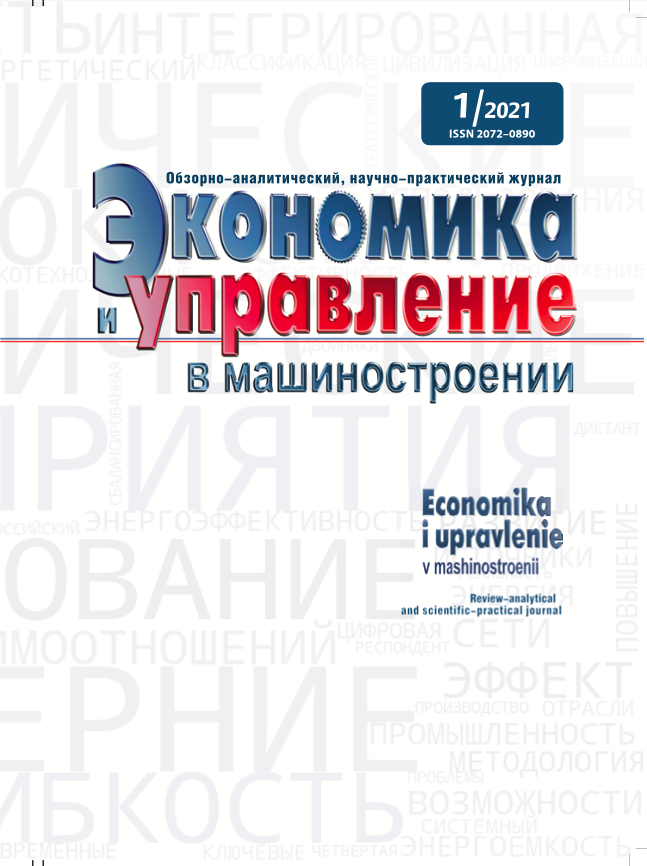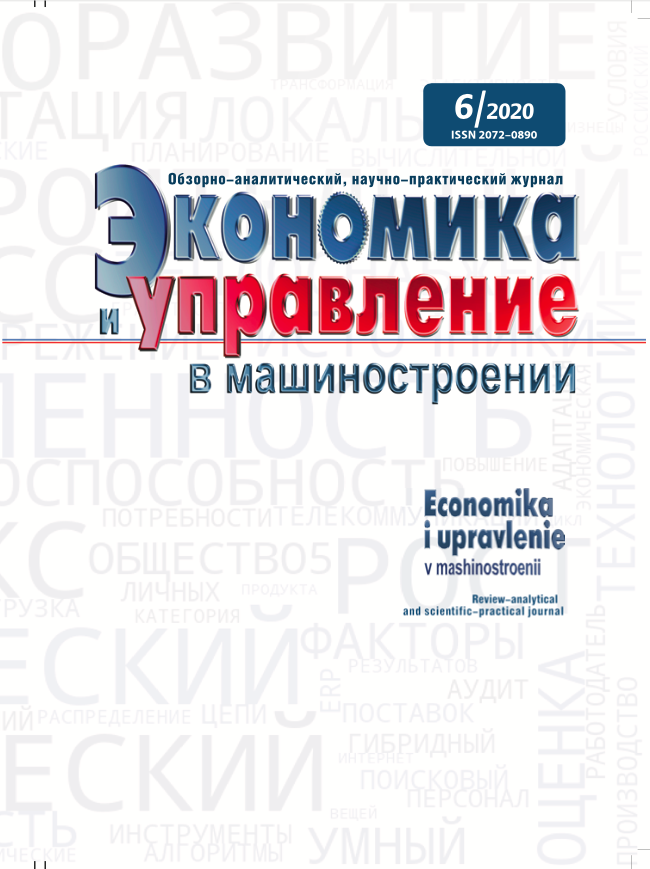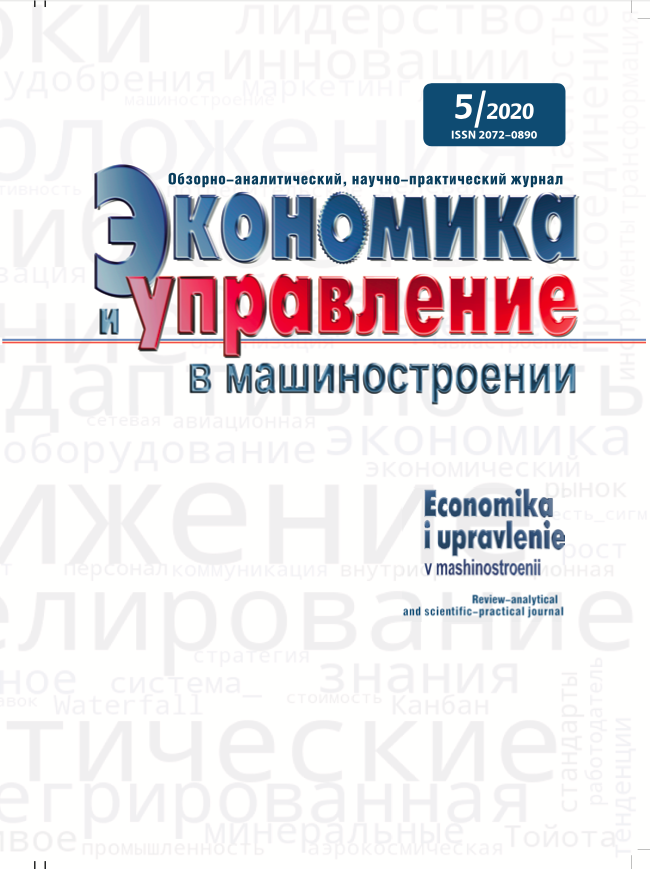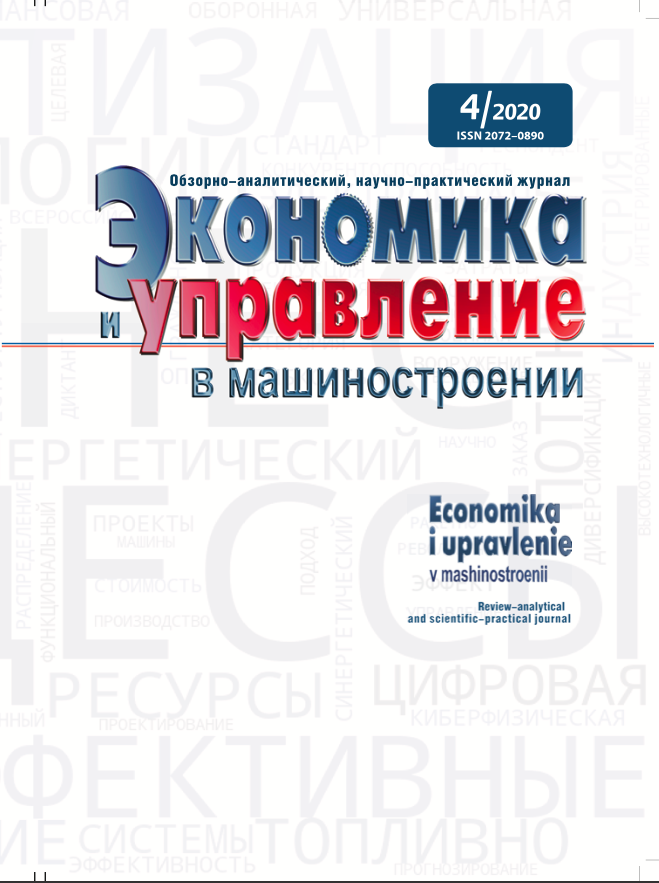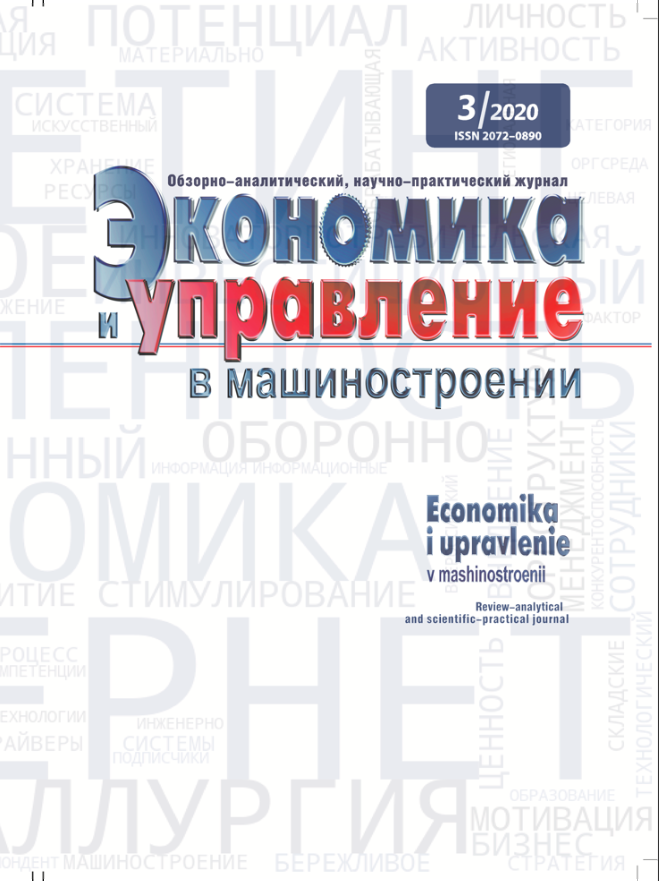OPERATION OF BUSINESS, INDUSTRIAL ENGINEERING
The theoretical foundations of the industry digital transformation in the context of the Fourth industrial revolution (part 2)
Andrianov A.M., postgraduate student at the Management and marketing of high-tech industries Department
Moscow Aviation Institute (National Research University), Moscow
Abstract: The technological development intensification of modern industry in recent years has contributed to significant progress in intelligent production automation systems development. The development and active implementation of such systems in enterprises made it possible to achieve a drastic increase in the production efficiency and to combine individual technical subsystems of these enterprises within the common digital infrastructure framework. The scale of changes in the production organization and management due to the these technologies usage allowed leading world scientists and experts to declare the beginning of the Fourth Industrial Revolution, also known as Industry 4.0. In the proposed study, the author analyzes both the prerequisites for the Fourth Industrial Revolution and the positions of individual scientists and researchers regarding its essence and influence on modern industry. In addition, in the final part of the study, the author considers some scenarios for the two Industry 4.0 technologies: digital twins and augmented reality.
Keywords: innovative economy, Fourth Industrial Revolution, Industry 4.0, production digitalization, digital twins, augmented reality
Analysis of the russian clusters development dynamics in the conditions of economy digital transformation (part 2)
Anisimov K.V., postgraduate student at the Management and marketing of high-tech industries Department
Moscow Aviation Institute (National Research University), Moscow
Abstract: The author’s research is devoted to the consideration of the problems of clusters creating and developing in Russia and abroad. The author justifies the relevance of creating clusters for the modern innovative economy, studies the main technological and organizational drivers of their development in the Fourth Industrial Revolution era. The second part of the study deals in detail with major state cluster programmes. The author pays special attention to the main indicators analysis reflecting the cluster formations development in high-tech sectors of Russian industry.
Keywords: innovative economy, the Fourth industrial revolution, economy digital transformation, cluster policy, cluster, cluster development dynamics
INNOVATIVE INVESTMENT ACTIVITY
Сoncept, essence and classification of clusters in the innovative economy conditions (Part 2)
Palamarchuk A. G., postgraduate student at the Management and marketing of high-tech industries Department
Moscow Aviation Institute (National Research University), Moscow
Abstract: In a modern innovative economy, the development of new forms of scientific and industrial cooperation, including cluster structures, is of particular importance. In the study, the author analyzes the prerequisites of the cluster theory development, the concept and essence of cluster structures. Classification of clusters is being developed on the basis of 10 classification criteria followed by the analysis of certain types of cluster formations reflected in it. The focus of the cluster on improving its own energy efficiency is highlighted as a priority criterion. Taking into account the high economic importance in the economic crisis context , the author’s definition of a new type of cluster structures – innovative energy-efficient clusters is being developed.
Keywords: innovation, Industry 4.0, high-tech industries, cluster, classification of clusters, innovative energy efficient cluster
MARKETING, SALES APPROACH
One-size-fits-all approach to creating a marketing strategy when developing and launching new products
Khasuntsev A. A., postgraduate student at the Logistics and Marketing Department
Financial University under the Government of the Russian Federation, Moscow
Abstract: The role and place of the marketing strategy in the new products development and launch changed along with the innovation process approaches evolution, towards increasing the role and importance. However, at the same time, the decision making goods sale model became more complicated, which significantly increased the time from the origin idea to the new product commercial sale. This problem can be solved by the one-size-fits-all approach to the marketing strategy formation, its place and role within the organizations’ innovative process.
Keywords: marketing strategy, innovation process, chains innovation model, funnel innovation approach, decision-making matrix
ENERGY SAVING AND ENERGY EFFICIENCY
Challenges in implementing energy-efficient technologies in industrial enterprises
Smirnov V. G., doctor of Economic sciences, professor at the Energy service and energy saving management Department
Moscow Aviation Institute (National Research University), Moscow
Tokareva V. V., student
Lomonosov Moscow State University, Moscow
Abstract: The article describes the problems of introducing energy-efficient technologies that exist in almost all national economy areas, including industry. This situation has occurred because of not yet been given due attention. This led to a low level of consciousness, a misunderstanding the importance of solving this problem both among developers of equipment, technologies, and energy users. This situation is the result of inadequate legislation and a higher degree of complexity in the process of energy-efficient technologies creating. The article also outlines the constraints in implementing energy-efficient technologies.
Keywords: energy-efficient technologies, increasing demand for fuel and energy resources, non-renewable energy resources, global fuel crisis, environmental degradation, climate warming, air pollution
Classification of energy-efficient technologies as a tool for systematic implementation of energy-saving measures in industrial enterprises
Koshelev A. S., assistant at the Management and marketing of high-tech industries Department
Moscow Aviation Institute (National Research University), Moscow
Abstract: The article is devoted to the creation of energy-saving technologies classification according to individual classification criteria. The author considers the industry-specific and cross-industry technology. The technologies implemented at the micro -, meso-and macro-levels are analyzed from the point of view of scale. Energy-saving technologies used in engineering networks, power supply systems and ventilation groups of industrial enterprises are described. The relevance of the energy-saving technologies usage based on renewable energy sources is indicated.
Keywords: classification of energy-efficient technologies, industry, energy saving, energy efficiency, energy intensity, technologies, energy efficient technologies, methodology, energy audit, renewable energy source
Preconditions and trends of energy saving management in the Russian Federation
Latypov E. R., assistant at the Management and marketing of high-tech industries Department
Moscow Aviation Institute (National Research University), Moscow
Tokareva V. V., student
Lomonosov Moscow State University, Moscow
Abstract: The article is devoted to the energy saving strategy development of the Russian Federation until 2035. The analysis of the electricity consumption statistics, as well as the energy consumption structure, is carried out, the main trends in the energy policy are outlined. The forecast of necessary investments in the fuel and energy complex is also presented. Particular attention is paid to the importance of energy consumption and energy audit. The main measures of the state energy policy of Russia are also noted.
Keywords: industry, energy saving, energy efficiency, energy intensity, technologies, energy efficient technologies, methodology, energy audit, renewable energy sources
EDUCATION AND PERSONNEL TRAINING
Analysis of the Fourth all-Russian Economic dictation results (Part 3)
Golov R. S., doctor of Economic sciences, professor, Head of the Management and marketing of high-tech industries Department
Moscow Aviation Institute (National Research University), Moscow
Abstract: The article discusses the Fourth all-Russian economic dictation results, which is held annually to determine and improve the level of economic literacy of Russia. A comparative analysis of the participants’ quantitative and qualitative composition and the dictation results in 2019 and 2020 is carried out. The important practical result of the action and its further development necessity are noted.
Keywords: all-Russian economic dictation, respondent, participants category, results distribution, economic population activity, economic population literacy
ANALYTICAL RESEARCH
Information technology market in the Russian Federation: challenges and prospects
Velmozhko I. I., student
Financial University under the Government of the Russian Federation, Moscow
Abstract: This article is devoted to the issues of becoming one of the key industries in terms of the country’s long-term economic growth, namely, the information technology sector. It examines the key features of the information technology market formation in the modern Russian economy and the main problems that hinder its full-scale development. Also, recommendations were developed to public administration bodies regarding the forms and methods of its regulation in order to realize this market segment potential and the digital economy formation in Russia.
Keywords: information technology, innovation, Internet, IT-services, software, knowledge-intensive industries, economic development
Analysis of the electric car market potential consumers’ segment
Nepluhina D. S., student
Financial University under the Government of the Russian Federation, Moscow
Kaminsky M. V., student
Financial University under the Government of the Russian Federation, Moscow
Kovalchuk Ju. A., doctor of Economic sciences, professor, professor at the Energy service and energy saving management Department
Moscow Aviation Institute (National Research University), Moscow
Abstract: The article presents the results of an analytical research of the emerging electric cars market and its consumers. A comparative analysis of cars with an internal combustion engine and electric vehicles on the economic and environmental aspects is carried out. The consumer’s assessment of the economy and convenience of using various types of cars, including the cost of operation, access to charging, and technical parameters of using the car, is given. The main target groups for the electric car purchase have been identified, as well as the prospects for the electric car market development in Russia, taking into account the need to modernize the energy industry and state support.
Keywords: industry, market, electric car, environmental friendliness, economy, consumer
Industry in the digitalization era: analysis of the state and main development directions (using the example of mechanical engineering) (Part 1)
Valieva Z. G., applicant at the Management and marketing of high-tech industries Department
Moscow Aviation Institute (National Research University), Moscow
Abstract: Modern Russian industry is the basis for ensuring the countries’ competitiveness, as well as sustainable GDP growth, including such high-tech economy sectors as mechanical engineering. The mechanical engineering development is currently at the junction of two problems that reflect both general trends in the industrial policy development, and taking into account the specifics of digitalization and cluster approaches in the industry. In this regard, a series of two articles addressing these problems is proposed. This article is devoted to the issues of modern industrial policy.
Keywords: industrial policy, digital economy, clusters
Analysis of the state and prospects of the mechanical engineering development (Part 1)
Kostygova L. A., cdoctor of Economic sciences, professor at the Management and marketing of high-tech industries Department
Moscow Aviation Institute (National Research University), Moscow
Tokareva V. V., student
Lomonosov Moscow State University, Moscow
Abstract: Mechanical engineering is one of the leading branches of Russian industry, so the problems concerning the state of the industry and the processes of its development are of great importance. The main trends in the development of mechanical engineering in modern conditions include digitalization, clustering, and sustainable development. In a series of two articles, these issues are considered. The first article of the series is devoted to the analysis of the state and processes of machine-building industry digitalization. As a result of the analysis, it was found that despite the negative factors (pandemic and sanctions) influence, the decline in mechanical engineering production was no more than 0.5%. Digitalization is a priority direction for the industry development. The industry has experience in the introduction of robotics, flexible systems, automation, the question is about creating a technological platform for Russian digital engineering for functioning on the basis of intersectoral systems and technological chains. An important element of digitalization is the transfer of the “gravity center” from the enterprise level to higher levels: corporate, industry and intersectoral.
Keywords: mechanical engineering state, digitalization based on intersectoral systems and technological chains

